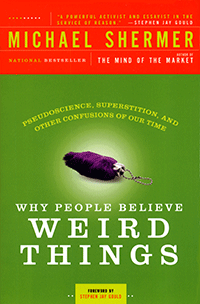www.skeptic.com
Why People Believe Weird Things is a great read. In the beginning of the book, Shermer talks about his own beliefs. He was raised as a Fundamentalist Christian Baptist, but began questioning his own beliefs in college. He first converted to Deism, which focuses on straying away from organized religion. Deists believe that you only need to focus on nature and the natural world to determine that a higher creator made our universe. He then became interested in New Age Mysticism. The New Age movement focused on joining Eastern and Western spiritualities, combined with psychology, parapsychology, physics, and holistic health/healing.
In the second part of the book, Shermer focuses on thinking on a paranormal level. He talks of the stereotypical person who believes paranormal facts, and other pseudoscientific knowledge. He points out that they are quick to believe facts that promote their own opinions and expectations, yet, refute or choose not research any information that goes against what they believe in, concerning specific pseudoscientific information. He goes into talking about why people believe things without hard evidence, which we talked about in lecture.
Part three of the book didn't really hold my interest too well, and I didn't think it pertained to the class as much as the first two parts. He mostly talked about creationist theories and claims; 25 to be exact. He listed each one consecutively, and tried to refute the claims with his own evidence and research. In part four, Shermer talks of Holocaust deniers and how, like pseudo/paranormal believers, they reject proven fact. This is the main problem as to why paranormal and pseudoscientific myths still exist. It can even happen with more serious events, which are actual true and factual, because of the same principles regarding things that are fake.
In part five, Shermer closes with some hard-hitting information. He claims that intelligent people are most susceptible to believing things that aren't true. He states that smart persons deceive themselves because their ego is as large as their intelligence. He explores people of this description, claiming that many scholars and respected scientists and dignitaries ruin their careers by changing their research concentration from a mainstream science, and focus on something paranormal or something of the pseudosciences, and completely destroy lifetimes of work, and also lose their respect from the scientific community. Most ruin their own lives.
Aside from the third chapter, though I didn't hate it completely, I really enjoyed the book. Why People Believe Weird Things insightful as it was interesting. Shermer made a lot of valid points, and I really appreciate what he does for the scientific community. Not many people want to even acknowledge some of the claims that these whack-jobs try to pass off as real information. I feel that someone needs to do so, so we can get back to real science.





No comments:
Post a Comment